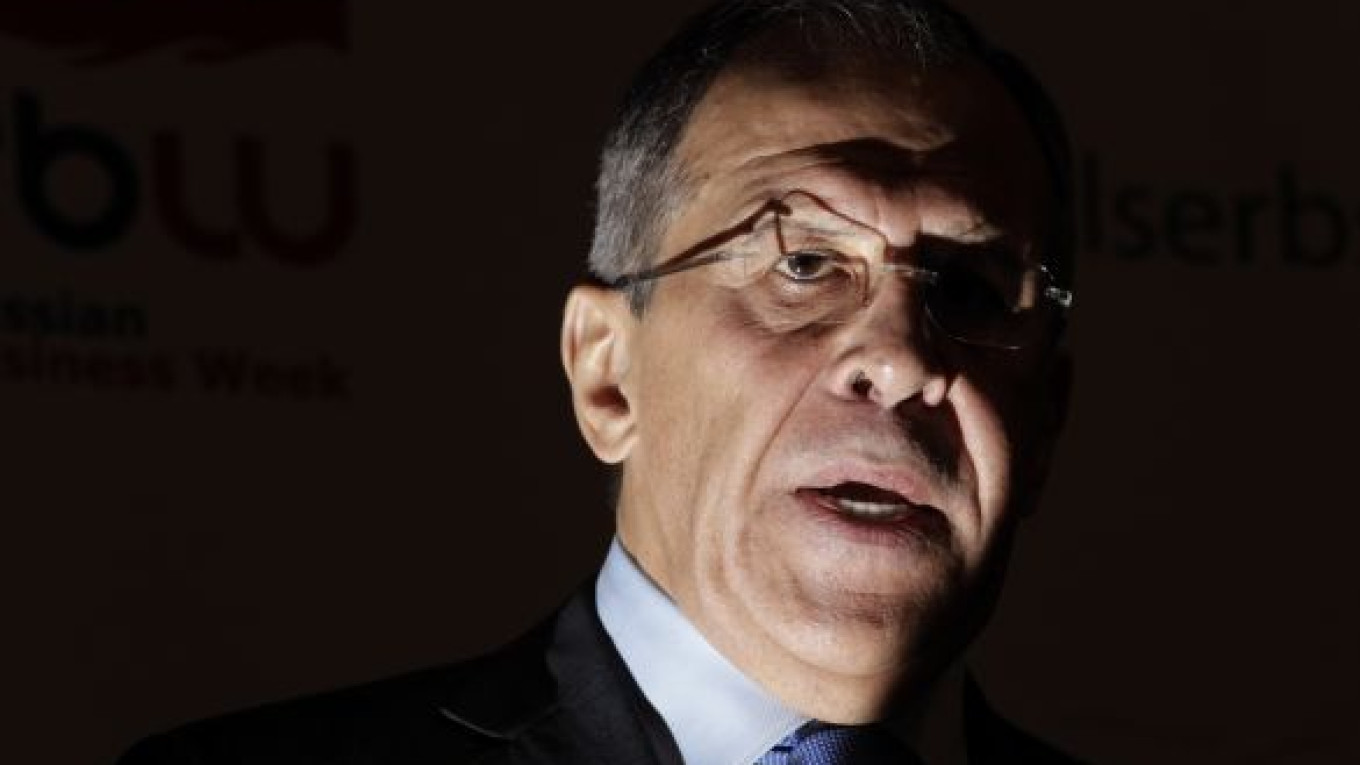LONDON — At the start of an official two-day visit to Britain, Foreign Minister Sergei Lavrov announced Tuesday that a new hotline would be installed between London and the Kremlin in an effort to improve strained relations between the two countries.
"It will be a modern communication link for a modern relationship," said his counterpart, British Foreign Minister William Hague.
This is the first time Lavrov has been in Britain as a guest of the British government since he assumed the office of Foreign Minister in 2004.
Hague visited Moscow in October 2010, but tit-for-tat diplomatic expulsions in December and a spat over the deportation and re-admission of the Moscow correspondent for Britain's Guardian newspaper last week have hampered any strong improvements in bilateral ties.
"We have had some serious disagreements," said Hague, and though he ruled out "giant leaps" forward, he added that he expects a "patient, steady improvement."
Speaking earlier in the day to the opening session of Russian Business Week hosted by the London School of Economics, Lavrov said he could "see no reason that [British-Russian] relations cannot be closer."
He praised the "strategic alliance" concluded between BP and state-owned Rosneft in January as an example of successful cooperation between the two countries.
Lavrov held discussions with Hague on Tuesday morning and had a meeting with British Prime Minister David Cameron in the afternoon, during which he issued an official invitation for Cameron's previously agreed visit to Russia in 2011. No date for the visit has been fixed.
Although both ministers identified the Domodedovo Airport bombing — in which one British citizen was killed — as an example of the threat to both countries from international terrorism, no agreement was signed on the subject of security collaboration. Addressing the issue of joint work on security issues, Lavrov said "competent bodies will think about cooperation."
Britain cut all links with Russia's Federal Security Service after Alexander Litvinenko died in London in 2006 from polonium poisoning. Russia has refused to extradite Andrei Lugovoi, the main suspect in the case, who is a member of the Duma and a former security agent.
Both Lavrov and Hague also identified hypocrisy, albeit from different perspectives, in the stances taken by some countries on the demonstrations sweeping the Middle East.
While Hague deplored the Iranian government's "shameless hypocrisy" in encouraging Egyptian protests while crushing those in its own country, Lavrov criticized those trying to impose a specific solution to the course of events.
"It is counter-productive to encourage democracy of some specific pattern," he said, and warned that to do so "was an example of double standards."
Speaking in broader terms at the London School of Economics, Lavrov highlighted President Dmitry Medvedev's modernization agenda as something that "embraces all avenues of the life of the country."
He added, however, that modernization driven by the Kremlin should be understood as a pan-European project. Russia is looking to reach out to expertise and technology from abroad, Lavrov said, just "as in the time of Peter the Great."
London — A Russian dissident living in Britain spoke to Lavrov after his Tuesday lecture at the London School of Economics, calling for the release of a jailed tycoon and drawing attention to Moscow's patchy democracy record.
"We would like to send gifts to different Russian people in politics. We would like to send English tea … without polonium-210 to Mr. Lugovoi," shouted Andrei Sidelnikov.
Russia refuses to extradite Andrei Lugovoi, whom Britain wants to prosecute for the murder of Alexander Litvinenko, a former Russian state security officer who died in London in 2006 from poisoning by radioactive polonium-210. "Lugovoi" is also Russian for a type of herbal tea.
Sidelnikov also said he passed him a copy of the Constitution and a mirror for Prime Minister Vladimir Putin, along with a request to free ex-Yukos bosses Mikhail Khodorkovsky and Platon Lebedev, jailed on politically tainted charges that critics link to Putin, for President Dmitry Medvedev, RIA-Novosti reported.
An agitated Lavrov jabbed his finger at Sidelnikov, saying he would "guarantee" the gifts would reach their destination.
(Reuters, MT)
A Message from The Moscow Times:
Dear readers,
We are facing unprecedented challenges. Russia's Prosecutor General's Office has designated The Moscow Times as an "undesirable" organization, criminalizing our work and putting our staff at risk of prosecution. This follows our earlier unjust labeling as a "foreign agent."
These actions are direct attempts to silence independent journalism in Russia. The authorities claim our work "discredits the decisions of the Russian leadership." We see things differently: we strive to provide accurate, unbiased reporting on Russia.
We, the journalists of The Moscow Times, refuse to be silenced. But to continue our work, we need your help.
Your support, no matter how small, makes a world of difference. If you can, please support us monthly starting from just $2. It's quick to set up, and every contribution makes a significant impact.
By supporting The Moscow Times, you're defending open, independent journalism in the face of repression. Thank you for standing with us.
Remind me later.


